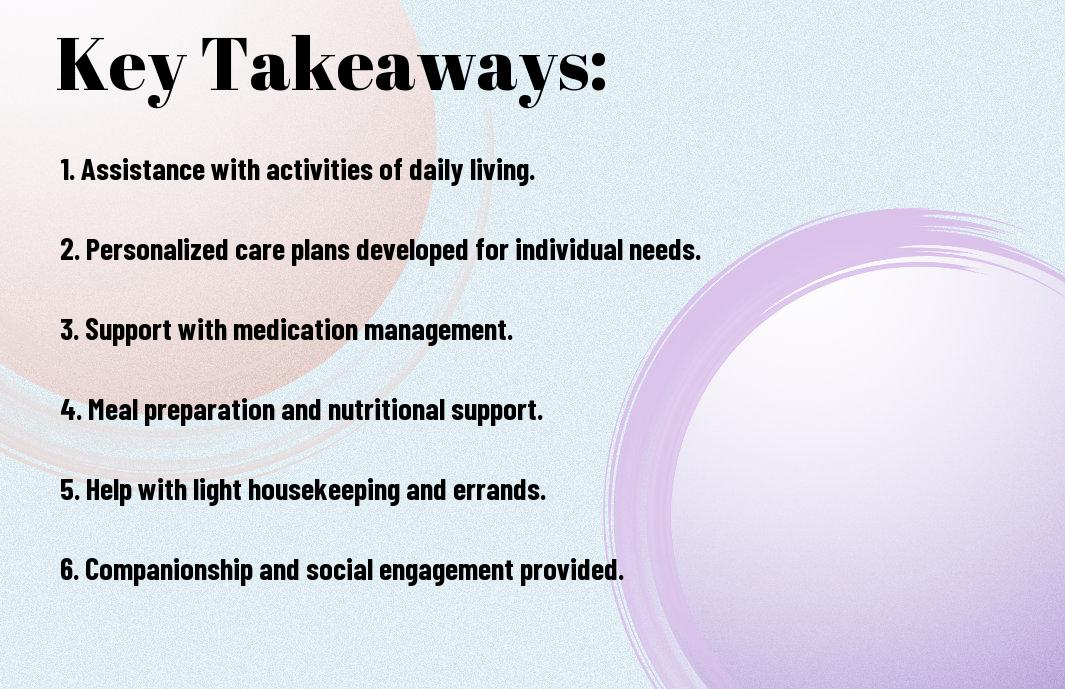
There’s no place like home when it comes to receiving comprehensive support for daily living. In this informative blog post, we will probe into the importance and benefits of crucial home care for individuals in need of personalized assistance with daily activities. Stay tuned to discover how home care services can enhance quality of life and promote independence for those seeking compassionate and professional care right in the comfort of their own homes.
Key Takeaways:
- Essential Home Care Provides Comprehensive Support: Essential home care offers a range of services to support daily living activities for individuals who need assistance.
- Promotes Independence and Well-Being: Comprehensive home care helps individuals maintain their independence while ensuring they receive the necessary support for a better quality of life.
- Personalized Care Plans: Essential home care services are tailored to the unique needs and preferences of each individual, providing personalized and holistic support.

The Importance of Daily Living Support
The Resources and Support for Older Adults Living Alone are important as they provide a safety net for those who may not have daily living support readily available. This kind of assistance can help individuals maintain their independence and lead a more fulfilling life, even in challenging circumstances.
Maintaining Independence
Living independently can become more challenging as we age, but with the right support in place, it is possible to maintain a sense of freedom and autonomy. Daily living support services can help older adults with tasks such as personal care, household chores, and medication management, enabling them to continue living in their own homes.
Enhancing Quality of Life
The enhancement of quality of life is a crucial aspect of daily living support. By providing assistance with activities of daily living, companionship, and access to important services, individuals can experience a higher level of well-being and satisfaction in their daily lives.
Life can be more enjoyable and fulfilling when individuals have the necessary support to help them navigate the challenges that come with aging. By ensuring access to comprehensive daily living support, older adults can live with dignity and peace of mind, knowing that their needs are being met.

Essential Home Care Services
You cannot underestimate the significance of imperative home care services in ensuring the well-being and quality of life for individuals requiring assistance with daily living activities. These services encompass a range of support tailored to meet the unique needs of each individual, providing a sense of independence and comfort within the familiar surroundings of their own home.
Personal Care Assistance
An integral aspect of imperative home care services is personal care assistance. This includes help with activities such as bathing, dressing, grooming, and toileting. Having assistance with personal care tasks can greatly enhance the individual’s quality of life and maintain their dignity and self-esteem.
Household Management
Any comprehensive home care service also includes assistance with household management tasks. This may involve light housekeeping, laundry, grocery shopping, and running errands to ensure the individual’s living environment is clean, organized, and conducive to their well-being. Effective household management can contribute to a safe and comfortable living space for the individual, promoting a sense of security and stability.
Management:
Household management services can also extend to medication reminders, scheduling appointments, and coordinating with healthcare providers. These additional tasks help in managing the individual’s overall well-being and ensuring they receive the necessary medical care and attention.
Meal Preparation and Nutrition
Care:
It is imperative to prioritize meal preparation and nutrition as part of imperative home care services. Caregivers can assist in planning and preparing nutritious meals tailored to the individual’s dietary needs and preferences. Proper nutrition is vital for maintaining optimal health and well-being, and having support in meal preparation can ensure the individual receives the necessary nutrients to thrive.
It is crucial to emphasize the importance of regular and balanced meals to support the individual’s overall health and vitality. Caregivers play a key role in promoting healthy eating habits and ensuring the individual’s nutritional needs are adequately met, contributing to their overall well-being and quality of life.
Benefits of Comprehensive Home Care
Improved Health Outcomes
One of the primary benefits of comprehensive home care is the significantly improved health outcomes it offers patients. By receiving personalized care in the comfort of their own homes, patients are more likely to adhere to their treatment plans and medication schedules. This increased compliance, coupled with the individualized attention from healthcare professionals, leads to better management of chronic conditions, faster recovery from illnesses, and overall improved well-being.
Reduced Hospital Readmissions
One of the significant advantages of comprehensive home care is the reduction in hospital readmissions. Patients who receive ongoing care and support at home are less likely to experience complications that would require them to be readmitted to the hospital. This not only saves healthcare costs but also enhances the patient’s overall quality of life by allowing them to recover in familiar surroundings.
With fewer hospital readmissions, patients can avoid the risks of hospital-acquired infections and other complications, ultimately leading to a more positive and successful recovery process.
Increased Patient Satisfaction
Satisfaction with the healthcare experience is a crucial aspect of comprehensive home care. Patients who receive personalized attention, ongoing support, and continuity of care in their homes report higher levels of satisfaction with their treatment. This personalized approach allows patients to feel more in control of their health and well-being, leading to a more positive outlook on their recovery journey.
A patient-centered approach that focuses on individual needs and preferences fosters a trusting relationship between the patient and the healthcare team, resulting in better health outcomes and overall satisfaction with the care received.

Customizing Home Care Plans
Assessing Individual Needs
Keep in mind that each individual has unique needs when it comes to home care. Assessing these needs is crucial to creating an effective care plan that addresses all aspects of daily living. From mobility issues to dietary restrictions, a thorough assessment ensures that no aspect of care is overlooked.
Creating Personalized Care Plans
To create personalized care plans, it is important to consider the individual’s preferences, routines, and medical requirements. Any effective care plan should be tailored to meet the specific needs of the person receiving care, promoting their well-being and independence.
Needs such as medication management, personal hygiene assistance, meal preparation, and companionship should be incorporated into the care plan based on the individual’s requirements. By taking a personalized approach, caregivers can ensure that the care provided is both comprehensive and tailored to the individual’s lifestyle.
Flexibility and Adaptability
To provide the best possible care, home care plans must be flexible and adaptable. As individuals’ needs evolve over time, caregivers should be able to adjust the care plan accordingly, ensuring that the individual continues to receive the necessary support.
This flexibility allows for a more responsive and person-centered approach to home care, enabling caregivers to meet changing needs and circumstances with ease. By staying adaptable, caregivers can ensure that the care provided remains effective and beneficial to the individual receiving support.
The Role of Caregivers
Now, caregivers play a vital role in providing necessary support and assistance to individuals who require daily living assistance. Organizations like Essential Home Care Plus train and deploy caregivers to deliver personalized care and support to clients in the comfort of their own homes.
Training and Support
Training is necessary to ensure that caregivers have the necessary skills and knowledge to provide high-quality care. Organizations like Essential Home Care Plus offer comprehensive training programs that cover a range of topics, including communication techniques, personal care assistance, medication management, and more.
Building Trust and Relationships
Building strong relationships based on trust and empathy is crucial in the caregiver-client dynamic. This bond not only enhances the quality of care provided but also enriches the overall well-being of the individual receiving care. Caregivers at Essential Home Care Plus are trained to build meaningful connections with their clients, fostering a supportive and compassionate environment.
This interpersonal connection goes beyond just fulfilling tasks; it involves truly understanding the needs and preferences of the individual under their care.
Managing Caregiver Burnout
Any caregiver, no matter how dedicated, can experience burnout due to the emotional and physical demands of the job. Organizations like Essential Home Care Plus prioritize caregiver well-being by providing ongoing support, resources, and respite care opportunities to prevent burnout and ensure that caregivers can continue to provide the best possible care to their clients.
Relationships between caregivers and clients can be deeply fulfilling but also challenging, requiring caregivers to prioritize self-care and seek support when needed. Organizations like Essential Home Care Plus recognize the importance of addressing caregiver burnout to maintain a high standard of care and promote overall well-being in both caregivers and clients.
Overcoming Common Challenges
Addressing Safety Concerns
After assessing the home environment, it is crucial to address any safety concerns that may pose a risk to the individual receiving home care. This can include removing tripping hazards, installing grab bars in the bathroom, ensuring proper lighting, and securing rugs to prevent falls. Ensuring a safe living space is important for the well-being of the individual and can significantly reduce the risk of accidents or injuries.
Managing Chronic Conditions
Any individual with chronic conditions requires specialized care to manage their health effectively. This may involve medication management, monitoring vital signs, assisting with mobility exercises, and providing emotional support. Managing chronic conditions requires a tailored approach to address the specific needs of each individual and improve their quality of life.
Individuals with chronic conditions may require frequent appointments with healthcare providers, such as doctors, specialists, or therapists. Coordinating these appointments and ensuring open communication between all parties is important for providing comprehensive care. Managing chronic conditions effectively often involves a team-based approach, where healthcare providers work together to optimize the individual’s health outcomes.
Coordinating with Healthcare Providers
Understanding the individual’s medical history, treatment plan, and healthcare goals is important for coordinating care effectively. By establishing regular communication with healthcare providers, caregivers can ensure that the individual’s needs are being met and any changes in their health status are addressed promptly.
On-time follow-up appointments and regular updates to the healthcare team can help prevent any gaps in care and promote continuity in the individual’s treatment plan. Coordinating with healthcare providers is a critical aspect of comprehensive home care and can lead to better health outcomes for the individual.
Summing up
The Comprehensive Support for Daily Living – Essential Home Care article provides valuable insights into the significance of receiving comprehensive home care services for individuals in need. It emphasizes the importance of such care in improving the quality of life, promoting independence, and enhancing overall well-being for those who require assistance with daily living activities. By highlighting the benefits of home care, the article effectively conveys the value of this necessary service in enabling individuals to age in place comfortably.
FAQ
Q: What is Comprehensive Support for Daily Living – Essential Home Care?
A: Comprehensive Support for Daily Living – Essential Home Care is a specialized form of care that provides a wide range of support services to individuals who need assistance with daily living activities in the comfort of their own homes.
Q: What services are typically included in Comprehensive Support for Daily Living – Essential Home Care?
A: Services can vary based on individual needs but may include assistance with personal hygiene, medication management, meal preparation, light housekeeping, transportation, companionship, and more.
Q: Who can benefit from Comprehensive Support for Daily Living – Essential Home Care?
A: Comprehensive Support for Daily Living – Essential Home Care is designed for individuals who may be elderly, disabled, convalescing from an illness or surgery, or who have chronic health conditions that require assistance with daily activities.
Q: What are the benefits of Comprehensive Support for Daily Living – Essential Home Care?
A: The benefits of Comprehensive Support for Daily Living – Essential Home Care include personalized care in familiar surroundings, increased independence, improved quality of life, enhanced safety, and peace of mind for both the individual receiving care and their family members.
Q: How is Comprehensive Support for Daily Living – Essential Home Care different from other types of care options?
A: Unlike assisted living facilities or nursing homes, Comprehensive Support for Daily Living – Essential Home Care allows individuals to remain in the comfort and familiarity of their own homes while receiving personalized care tailored to their specific needs.
Q: How can one access Comprehensive Support for Daily Living – Essential Home Care services?
A: Access to Comprehensive Support for Daily Living – Essential Home Care services typically involves contacting a home care agency or provider who will assess the individual’s needs and create a customized care plan that addresses those needs.
Q: Is Comprehensive Support for Daily Living – Essential Home Care covered by insurance?
A: In some cases, Comprehensive Support for Daily Living – Essential Home Care may be covered by insurance, Medicare, or Medicaid, depending on the individual’s specific circumstances and the services required. It is advisable to consult with the insurance provider or a healthcare professional for guidance on coverage options.

No Comments